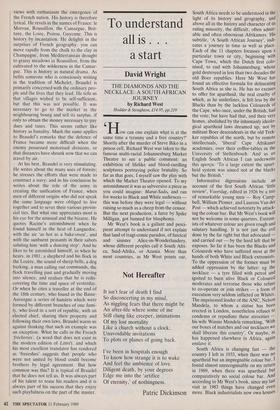The Victor Hugo of historians
Douglas Johnson
THE IDENTITY OF FRANCE: VOLUME I: HISTORY AND ENVIRONMENT by Fernand Braudel translated by Sian Reynolds
Collins, f20, pp.432
Fernand Braudel was born in 1902 and died in 1985 at the age of 83. Victor Hugo was born in 1802 and also died at the age of 83. The coincidence was irresistible. Braudel has been made the Victor Hugo of historians, a grand and imposing title. The fact that he had only been elected to the Academy a matter of months before his death merely served to enhance his reputa- tion. Braude] was an official, establishment figure, one who represented French cul- ture at its most incisive. At the same time, he was the hero of the radicals and the unorthodox, one who had sought original- ity and who had successfully defied many conventions. His career demonstrated this duality. He had respected the normal method of procedure insofar as he com- pleted a massive doctoral thesis on the Mediterranean at the time of Philip II, undoubtedly one of the most superb theses that have ever been submitted to the University of Paris. Yet having fulfilled the requirements, he continued to defy and to despise the Sorbonne and he encouraged those who worked under his patronage to do the same. No wonder that his work is uniformly praised and respected. Yet, as one or two daring individuals have suggested, whilst he was always stim- ulating and interesting, as befitted an historian who enjoyed his work, there are moments in his writings which are less remarkable than others. The Identity of France is the first volume of two which Braude! completed shortly before his death in a projected trilogy which sought to present a new vision of French history to a wide public. Whilst bearing in mind, there- fore, that this is only a part of an un- finished work, and that the author might have carried out revisions had he lived, one is tempted to see in this volume certain of both his qualities and limitations. To begin with, Braudel does not set his sights low. He compares himself to Michelet, declaiming his passion for France and his conviction that French history can only be understood by one who views with enthusiasm the emergence of the French nation. His history is therefore lyrical. He revels in the names of France: le Morvan, Roussillon, the Camargue, Brit- tany, the Loire, Poitou, Guyenne. This is history by incantation. He delights in the surprises of French geography: you can move rapidly from the chalk to the clay in Champagne, from Mediterranean drought to grassy meadows in Roussillon, from the cultivated to the wilderness in the Camar- gue. This is history as natural drama. As befits someone who is consciously writing in the tradition of Michelet, Braudel is primarily concerned with the ordinary peo- ple and the lives that they lead. He tells us that villages wished to be self-sufficient, but that this was not possible. It was necessary to go to the market in the neighbouring bourg and sell its surplus, if only to obtain the money necessary to pay dues and taxes. This seems rather like history as banality. Much the same applies to Braudel's remarks that the defence of France became more difficult when the enemy possessed motorised divisions, or that distances have shrunk now that we can travel by air.
At his best, Braudel is very stimulating. He writes about the many uses of forests; he stresses the efforts that were made to construct a navy; and in his conclusion he writes about the role of the army in creating the unification of France, when men of different origins who did not speak the same language were obliged to live together and to sever their various provin- cial ties. But what one appreciates most is his eye for the unusual and the bizarre. He quotes Racine's astonishment when he found himself in the heat of Languedoc, with the air 'as hot as a bake-oven', and with the sunburnt peasants in their sabots saluting him 'with a dancing step'. And he likes to be astonished himself, as when he hears, in 1981, a shepherd and his flock in the Lozere, the sound of sheep bells, a dog barking, a man calling out commands, the flock travelling past and gradually moving into silence, and realises that he is redis- covering the time and space of yesterday. Or when he cites a traveller at the end of the 18th century, who found in the Basse- Auvergne a series of hamlets which were formed by different branches of one fami- ly, who lived in a sort of republic, with an elected chief, sharing their property and following their own laws. Braudel warns us against thinking that such an example was an exception. What he calls in the French frecheries', (a word that does not exist in the modern edition of Littre), and which his most excellent translator has rendered as 'frereshes' suggests that people who were not united by blood could become brothers by legal agreement. But how common was this? It is typical of Braude! that he does not tell us. It was always part of his talent to tease his readers and it is always part of his success that they enjoy such playfulness on the part of the master.



























































 Previous page
Previous page